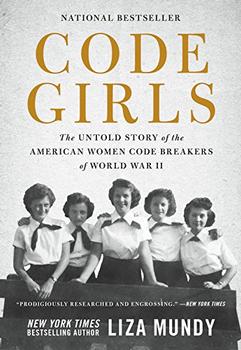Summary | Excerpt | Reading Guide | Discuss | Reviews | Beyond the Book | Readalikes | Genres & Themes | Author Bio

The Untold Story of the American Women Code Breakers of World War II
by Liza Mundy
Unlike the Navy, Arlington Hall also had an African American code- breaking unit. This was not so much because the place was unusually liberal-minded, but rather because Eleanor Roosevelt— or somebody at the top—had declared that 12 to 15 percent of the Arlington Hall workforce should be black. It was poor recompense for the fact that many of Arlington's black residents had been pushed out of their homes by the construction of the Pentagon and other military edifices, but work was welcome and this was better than nothing. Arlington Hall's African American workers had to take segregated transport to get there, and many, even those who were college graduates, were given menial jobs as janitors and messengers. But there also was a special code-breaking unit whose existence was unknown to many of the white workers. The African American unit monitored the enciphered communications of companies and banks to see what was being transmitted in the global private sector and who was doing business with Hitler or Mitsubishi. They kept a library of 150 systems, with careful files of addresses and characteristics of all the world's main commercial codes. There was no shortage of qualified people to staff it: Despite its segregated school system and the inequality of resources that accompanied segregation, the city of Washington had a number of highly regarded black public schools, as well as Howard, one of the country's premier historically black universities. One of the team members, Annie Briggs, started out as a secretary and rose to head the production unit. Another, Ethel Just, led the expert translators.
The team was led by a black man, William Coffee, who studied English at Knoxville College in Tennessee, started out as a janitor and messenger at Arlington Hall, and rose to this position.
In short, in its eclecticism and, often, its eccentricity, the atmosphere at Arlington Hall was unlike anything the U.S. military had ever produced. When Juanita Morris, a college student fresh from North Carolina, showed up on her first day, she was directed to a dim room where she saw a woman holding an ice pack to her head, another wearing a sun visor, a man walking around in his underwear (he had been caught in the rain and had hung his clothes up to dry), and another who was barefoot. "This is the German section," someone told her, and left. Her father had told her to come back home if things didn't work out, and for the first couple of weeks, she was tempted.
Arlington Hall was a military operation, but only in a nominal sense. An Army colonel named Preston Corderman had taken over as head, but Corderman was hardly a rigid disciplinarian. He knew whom he was dealing with. When the code breakers figured out how to rig a Coke machine to make it run continuously and spew free liquid—they achieved this by inserting a coin and unplugging the wall plug—Corderman sent around a memo drily congratulating them for having "solved the machine" and suggesting that it was time to pay the requisite nickel per cup.
Physically, the place was a hodgepodge. The main schoolhouse retained its languid Old Virginia finishing-school flavor, but the new temporary buildings were purely functional. Building A—where the Purple cipher was attacked along with other ciphers—consisted of two floors and a basement with a fireproof vault. Designed to hold 2,200 people, it quickly proved inadequate, and so B was built. Soon the campus boasted a beauty parlor, a tailor, a barbershop, a dispensary with fourteen beds, a 6 20-seat auditorium and theater, a mess hall, a car repair shop, a warehouse, and a recreation building. The two main buildings were poorly insulated, chilly in winter and sweltering in summer.
There was much fan drama, what one worker called "a constant war of direction and re-direction," in which the goal was to get the full force of the fan directed at somebody else while the gentle wafting breezes floated toward you.
Excerpted from Code Girls by Liza Mundy. Copyright © 2017 by Liza Mundy. Excerpted by permission of Hachette Book Group. All rights reserved. No part of this excerpt may be reproduced or reprinted without permission in writing from the publisher.
What really knocks me out is a book that, when you're all done reading, you wish the author that wrote it was a ...
Click Here to find out who said this, as well as discovering other famous literary quotes!
Your guide toexceptional books
BookBrowse seeks out and recommends the best in contemporary fiction and nonfiction—books that not only engage and entertain but also deepen our understanding of ourselves and the world around us.